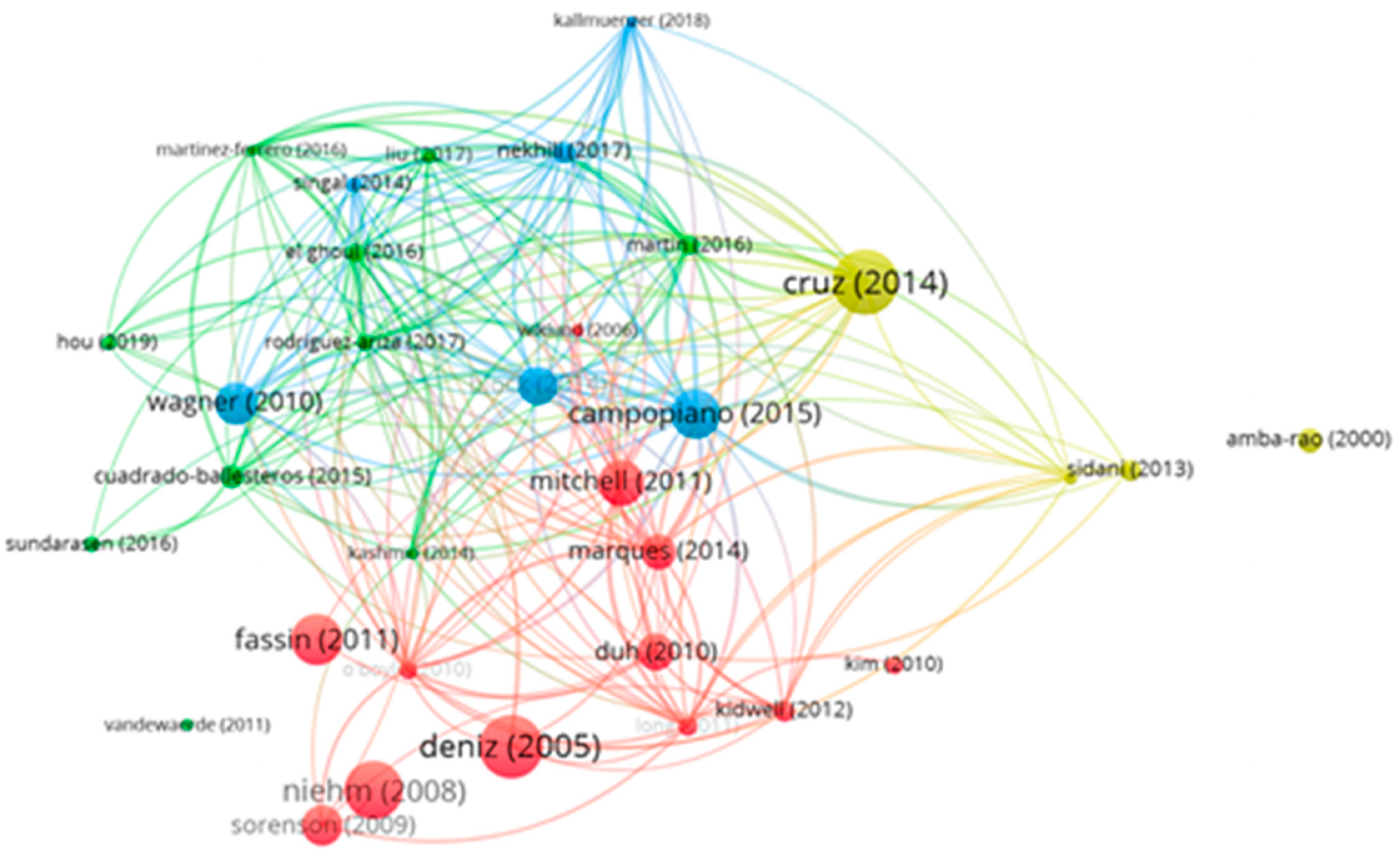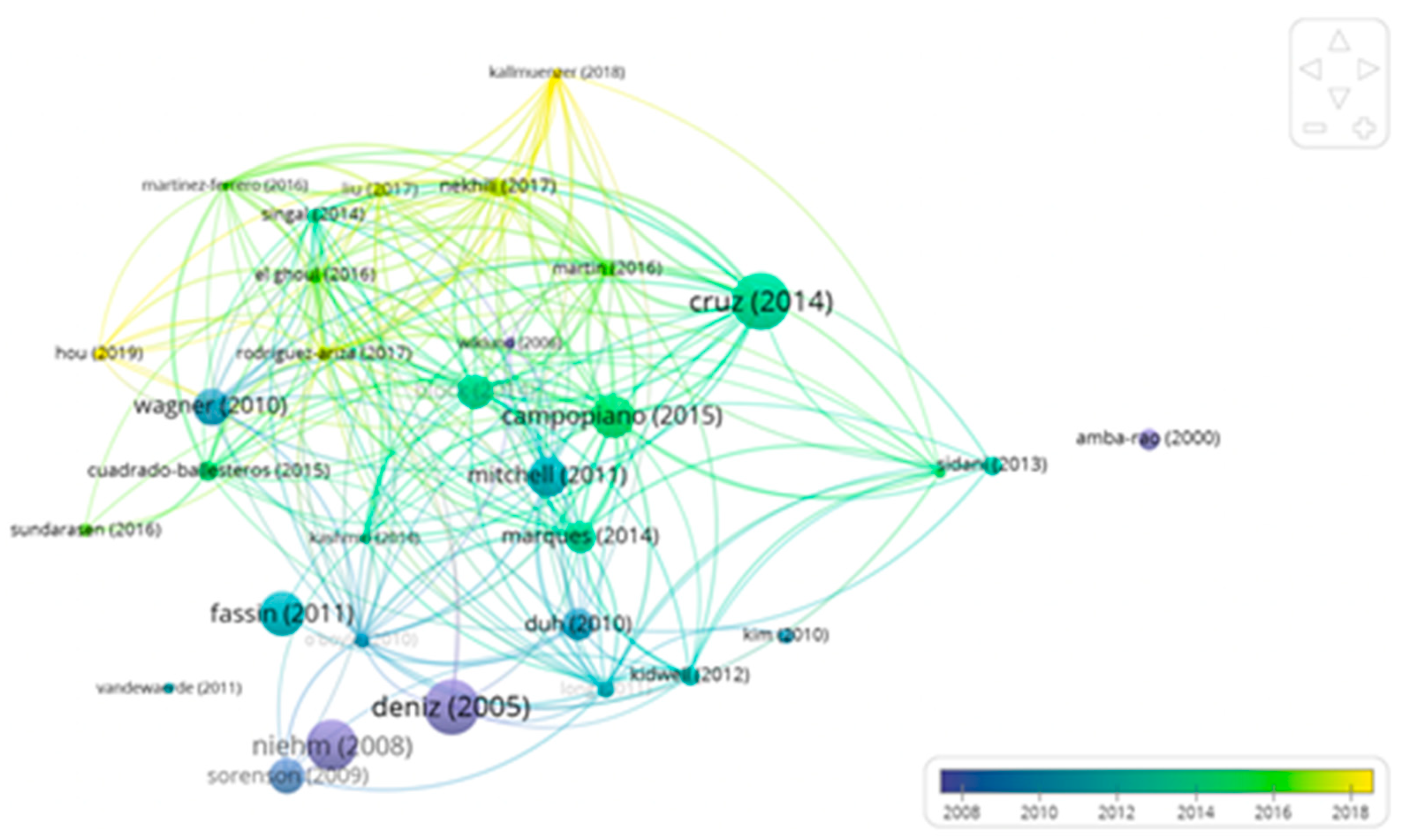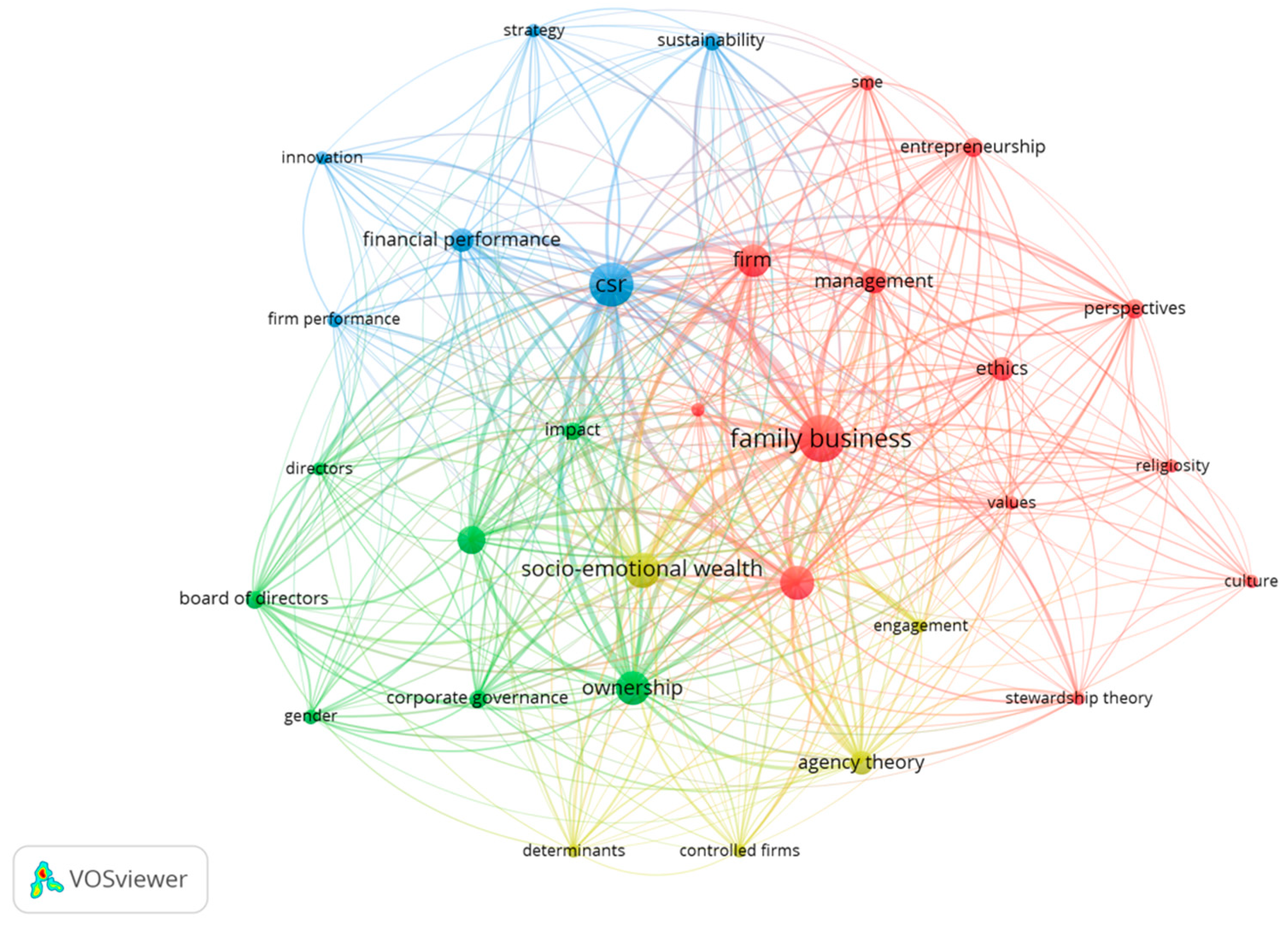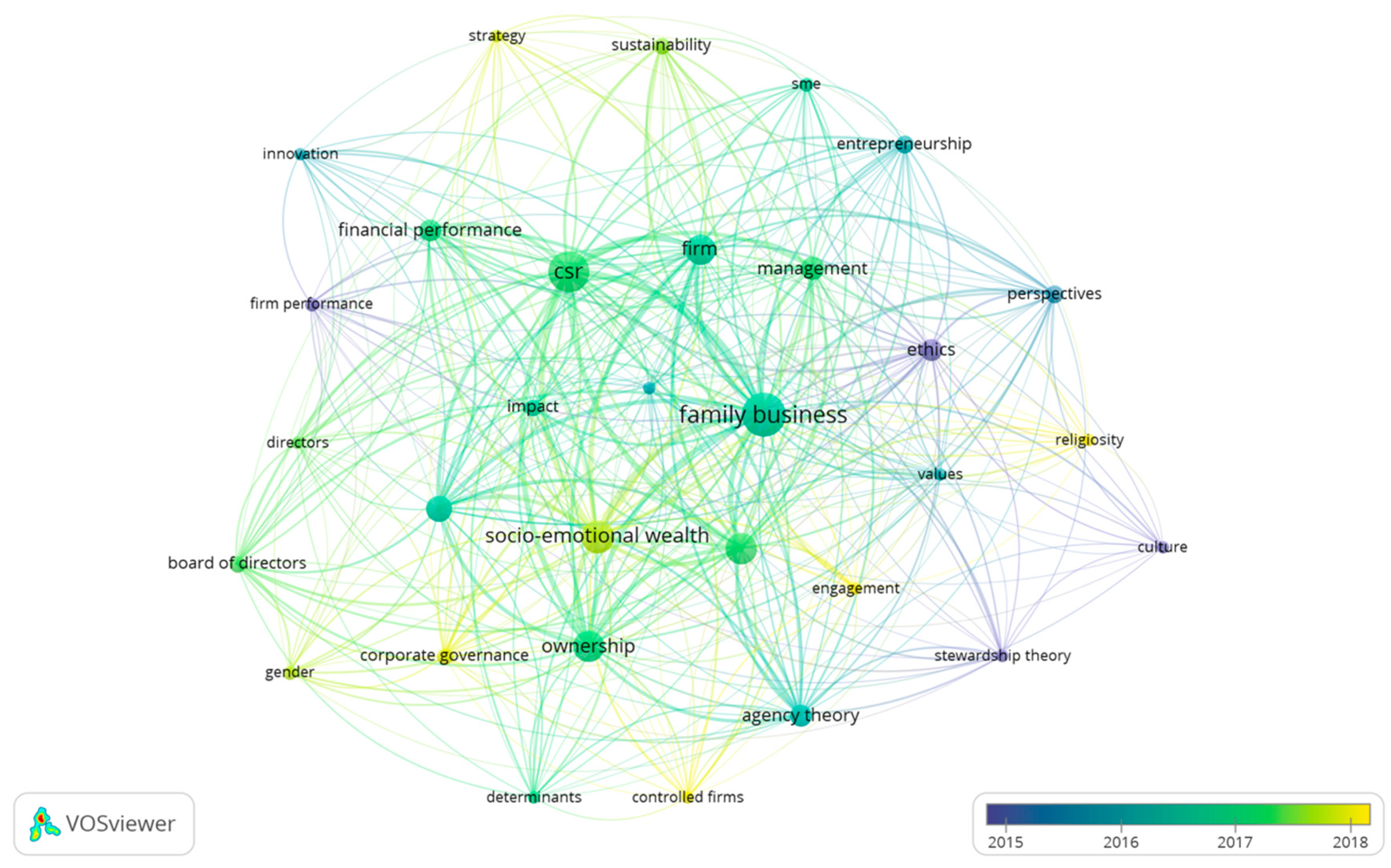Ethics and Social Responsibility in Family Firms. Research Domain and Future Research Trends from a Bibliometric Perspective
Abstract
:1. Introduction
2. Literature Review
3. Methodology
4. Analysis of the Results of the Bibliographical Coupling
5. Discussion and Conclusions
Author Contributions
Funding
Institutional Review Board Statement
Informed Consent Statement
Data Availability Statement
Conflicts of Interest
References
- Hasan, I.; Kobeissi, N.; Liu, L.; Wang, H. Corporate Social Responsibility and Firm Financial Performance: The Mediating Role of Productivity. J. Bus. Ethics 2018, 149, 671–688. [Google Scholar] [CrossRef] [Green Version]
- Husted, B.W.; Allen, D.B. Corporate Social Responsibility in the Multinational Enterprise: Strategic and Institutional Approaches. J. Int. Bus. Stud. 2006, 37, 838–849. [Google Scholar] [CrossRef]
- Park, B.I.; Ghauri, P.N. Determinants Influencing CSR Practices in Small and Medium Sized MNE Subsidiaries: A Stakeholder Perspective. J. World Bus. 2015, 50, 192–204. [Google Scholar] [CrossRef]
- Lepoutre, J.; Heene, A. Investigating the Impact of Firm Size on Small Business Social Responsibility: A Critical Review. J. Bus. Ethics 2006, 67, 257–273. [Google Scholar] [CrossRef]
- Moneva-abadía, J.M.; Gallardo-vázquez, D.; Sánchez-hernández, M.I. Corporate Social Responsibility as a Strategic Opportunity for Small Firms during Economic Crises. J. Small Bus. Manag. 2019, 57, 172–199. [Google Scholar] [CrossRef] [Green Version]
- Orlitzky, M.; Schmidt, F.L.; Rynes, S.L. Corporate Social and Financial Performance: A Meta-Analysis. Organ. Stud. 2003, 24, 403–441. [Google Scholar] [CrossRef]
- Waddock, S.A.; Graves, S.B. The Corporate Social Performance-Financial Performance Link. Strat. Mgmt. J. 1997, 18, 303–319. [Google Scholar] [CrossRef]
- Crespo, A.H.; del Bosque, I.R. Influence of Corporate Social Responsibility on Loyalty and Valuation of Services. J. Bus. Ethics 2005, 61, 369–385. [Google Scholar] [CrossRef]
- Fuentes-García, F.J.; Núñez-Tabales, J.M.; Veroz-Herradón, R. Applicability of Corporate Social Responsibility to Human Resources Management: Perspective from Spain. J. Bus. Ethics 2008, 82, 27–44. [Google Scholar] [CrossRef]
- Shahzad, F.; Rehman, I.U.; Nawaz, F.; Nawab, N. Does Family Control Explain Why Corporate Social Responsibility Affects Investment Efficiency? Corp. Soc. Responsib. Environ. Manag. 2018, 25, 880–888. [Google Scholar] [CrossRef]
- Block, J.H.; Wagner, M. The Effect of Family Ownership on Different Dimensions of Corporate Social Responsibility: Evidence from Large US Firms: Effect of Family Ownership on Corporate Social Responsibility. Bus. Strat. Environ. 2014, 23, 475–492. [Google Scholar] [CrossRef]
- Aparicio, G.; Ramos, E.; Casillas, J.-C.; Iturralde, T. Family Business Research in the Last Decade. A Bibliometric Review. EJFB 2021, 11, 33–34. [Google Scholar] [CrossRef]
- Binz Astrachan, C.; Botero, I.C. “We Are a Family Firm”: An Exploration of the Motives for Communicating the Family Business Brand. JFBM 2018, 8, 2–21. [Google Scholar] [CrossRef]
- De Bakker, F.G.A.; Groenewegen, P.; Den Hond, F. A Bibliometric Analysis of 30 Years of Research and Theory on Corporate Social Responsibility and Corporate Social Performance. Bus. Soc. 2005, 44, 283–317. [Google Scholar] [CrossRef] [Green Version]
- Feng, Y.; Zhu, Q.; Lai, K.-H. Corporate Social Responsibility for Supply Chain Management: A Literature Review and Bibliometric Analysis. J. Clean. Prod. 2017, 158, 296–307. [Google Scholar] [CrossRef]
- Low, M.P.; Siegel, D. A Bibliometric Analysis of Employee-Centred Corporate Social Responsibility Research in the 2000s. SRJ 2019, 16, 691–717. [Google Scholar] [CrossRef]
- Ferreira, J.J.; Fernandes, C.I.; Schiavone, F.; Mahto, R.V. Sustainability in Family Business—A Bibliometric Study and a Research Agenda. Technol. Forecast. Soc. Chang. 2021, 173, 121077. [Google Scholar] [CrossRef]
- López-Fernández, M.C.; Serrano-Bedia, A.M.; Pérez-Pérez, M. Entrepreneurship and Family Firm Research: A Bibliometric Analysis of an Emerging Field. J. Small Bus. Manag. 2016, 54, 622–639. [Google Scholar] [CrossRef]
- Casprini, E.; Dabic, M.; Kotlar, J.; Pucci, T. A Bibliometric Analysis of Family Firm Internationalization Research: Current Themes, Theoretical Roots, and Ways Forward. Int. Bus. Rev. 2020, 29, 101715. [Google Scholar] [CrossRef]
- Canavati, S. Corporate Social Performance in Family Firms: A Meta-Analysis. JFBM 2018, 8, 235–273. [Google Scholar] [CrossRef]
- Preslmayer, C.; Kuttner, M.; Feldbauer-Durstmüller, B. Uncovering the Research Field of Corporate Social Responsibility in Family Firms: A Citation Analysis. JFBM 2018, 8, 169–195. [Google Scholar] [CrossRef]
- Mariani, M.M.; Al-Sultan, K.; De Massis, A. Corporate Social Responsibility in Family Firms: A Systematic Literature Review. J. Small Bus. Manag. 2021, 1–55. [Google Scholar] [CrossRef]
- Vazquez, P. Family Business Ethics: At the Crossroads of Business Ethics and Family Business. J. Bus. Ethics 2018, 150, 691–709. [Google Scholar] [CrossRef]
- Combs, J.G.; Gentry, R.J.; Lux, S.; Jaskiewicz, P.; Crook, T.R. Corporate Political Activity and Sensitivity to Social Attacks: The Case of Family-Managed Firms. Fam. Bus. Rev. 2020, 33, 152–174. [Google Scholar] [CrossRef]
- Narin, F. Evaluative Bibliometrics: The Use of Publication and Citation Analysis in the Evaluation of Scientific Activity; Computer Horizons: Cherry Hill, NJ, USA, 1976. [Google Scholar]
- Weingart, P. Impact of Bibliometrics upon the Science System: Inadvertent Consequences? Scientometrics 2005, 62, 117–131. [Google Scholar] [CrossRef]
- Daim, T.U.; Rueda, G.; Martin, H.; Gerdsri, P. Forecasting Emerging Technologies: Use of Bibliometrics and Patent Analysis. Technol. Forecast. Soc. Chang. 2006, 73, 981–1012. [Google Scholar] [CrossRef]
- Li, L.-L.; Ding, G.; Feng, N.; Wang, M.-H.; Ho, Y.-S. Global Stem Cell Research Trend: Bibliometric Analysis as a Tool for Mapping of Trends from 1991 to 2006. Scientometrics 2009, 80, 39–58. [Google Scholar] [CrossRef]
- Fetscherin, M.; Heinrich, D. Consumer Brand Relationships Research: A Bibliometric Citation Meta-Analysis. J. Bus. Res. 2015, 68, 380–390. [Google Scholar] [CrossRef]
- Zhao, H.; Zhang, F.; Kwon, J. Corporate Social Responsibility Research in International Business Journals: An Author Co-Citation Analysis. Int. Bus. Rev. 2018, 27, 389–400. [Google Scholar] [CrossRef]
- Waldman, D.A.; Sully de Luque, M.; Washburn, N.; House, R.J.; Adetoun, B.; Barrasa, A.; Bobina, M.; Bodur, M.; Chen, Y.-J.; Debbarma, S.; et al. Cultural and Leadership Predictors of Corporate Social Responsibility Values of Top Management: A GLOBE Study of 15 Countries. J. Int. Bus. Stud. 2006, 37, 823–837. [Google Scholar] [CrossRef]
- Hofman, P.S.; Newman, A. The Impact of Perceived Corporate Social Responsibility on Organizational Commitment and the Moderating Role of Collectivism and Masculinity: Evidence from China. Int. J. Hum. Resour. Manag. 2014, 25, 631–652. [Google Scholar] [CrossRef] [Green Version]
- Vitell, S.J.; King, R.A.; Howie, K.; Toti, J.-F.; Albert, L.; Hidalgo, E.R.; Yacout, O. Spirituality, Moral Identity, and Consumer Ethics: A Multi-Cultural Study. J. Bus. Ethics 2016, 139, 147–160. [Google Scholar] [CrossRef]
- Hidalgo, E.R. La Ética del Marketing; Importancia de la Ética y Responsabilidad Social para la Efectividad Organizacional. Universidad de Sevilla. 2001. Available online: http://purl.org/dc/dcmitype/Text (accessed on 15 September 2021).
- Vitell, S.J.; Hidalgo, E.R. The Impact of Corporate Ethical Values and Enforcement of Ethical Codes on the Perceived Importance of Ethics in Business: A Comparison of U.S. and Spanish Managers. J. Bus. Ethics 2006, 64, 31–43. [Google Scholar] [CrossRef]
- Awaysheh, A.; Heron, R.A.; Perry, T.; Wilson, J.I. On the Relation between Corporate Social Responsibility and Financial Performance. Strateg. Manag. J. 2020, 41, 965–987. [Google Scholar] [CrossRef]
- Latif, K.F.; Pérez, A.; Sahibzada, U.F. Corporate Social Responsibility (CSR) and Customer Loyalty in the Hotel Industry: A Cross-Country Study. Int. J. Hosp. Manag. 2020, 89, 102565. [Google Scholar] [CrossRef]
- Quéré, B.P.; Nouyrigat, G.; Baker, C.R. A Bi-Directional Examination of the Relationship Between Corporate Social Responsibility Ratings and Company Financial Performance in the European Context. J. Bus. Ethics 2018, 148, 527–544. [Google Scholar] [CrossRef]
- Ratten, V.; Fakhar Manesh, M.; Pellegrini, M.M.; Dabic, M. The Journal of Family Business Management: A Bibliometric Analysis. J. Fam. Bus. Manag. 2020, 11, 137–160. [Google Scholar] [CrossRef]
- Dana, L.-P.; Kumar, S.; Pandey, N.; Sureka, R. The Journal of Small Business Management: A Bibliometric Overview of 1996–2019. J. Small Bus. Manag. 2021, 59, S215–S236. [Google Scholar] [CrossRef]
- Alayo, M.; Iturralde, T.; Maseda, A.; Aparicio, G. Mapping Family Firm Internationalization Research: Bibliometric and Literature Review. Rev. Manag. Sci. 2021, 15, 1517–1560. [Google Scholar] [CrossRef]
- Thukral, S.; Jain, A. Unveiling Contemporary Dimensions in the Internationalisation of Family Firms through Bibliometric Analysis and Thematic Analysis. Rev. Int. Bus. Strategy 2021. ahead-of-print. [Google Scholar] [CrossRef]
- Aparicio, G.; Iturralde, T.; Sanchez-Famoso, V. Innovation in Family Firms: A Holistic Bibliometric Overview of the Research Field. Eur. J. Fam. Bus. 2019, 9, 71–84. [Google Scholar] [CrossRef]
- Nordin, N.; AK, S.-N.; Ale Ebrahim, N.; Samsudin, M.A. Bibliometric Analysis of Publication Trends in Family Firms’ Social Capital in Emerging Economies; Social Science Research Network: Rochester, NY, USA, 2020. [Google Scholar]
- Cisneros, L.; Ibanescu, M.; Keen, C.; Lobato-Calleros, O.; Niebla-Zatarain, J. Bibliometric study of family business succession between 1939 and 2017: Mapping and analyzing authors’ networks. Scientometrics 2018, 117, 919–951. [Google Scholar] [CrossRef]
- Latapí Agudelo, M.A.; Jóhannsdóttir, L.; Davídsdóttir, B. A Literature Review of the History and Evolution of Corporate Social Responsibility. Int. J. Corp. Soc. Responsib. 2019, 4, 1. [Google Scholar] [CrossRef] [Green Version]
- Crane, A. (Ed.) The Oxford Handbook of Corporate Social Responsibility; Oxford handbooks; Oxford University Press Inc.: Oxford, UK; New York, NY, USA,, 2008; ISBN 9780199211593. [Google Scholar]
- Bowen, H.R. Social Responsibilities of the Businessman; University of Iowa Press: Iowa, IA, USA, 2013; ISBN 9781609381967. [Google Scholar]
- Matten, D.; Moon, J. Reflections on the 2018 Decade Award: The Meaning and Dynamics of Corporate Social Responsibility. AMR 2020, 45, 7–28. [Google Scholar] [CrossRef]
- Zhao, X.; Wu, C.; Chen, C.C.; Zhou, Z. The Influence of Corporate Social Responsibility on Incumbent Employees: A Meta-Analytic Investigation of the Mediating and Moderating Mechanisms. J. Manag. 2020, 48, 114–146. [Google Scholar] [CrossRef]
- Drempetic, S.; Klein, C.; Zwergel, B. The Influence of Firm Size on the ESG Score: Corporate Sustainability Ratings Under Review. J. Bus. Ethics 2020, 167, 333–360. [Google Scholar] [CrossRef]
- Uyar, A.; Kuzey, C.; Kilic, M.; Karaman, A.S. Board Structure, Financial Performance, Corporate Social Responsibility Performance, CSR Committee, and CEO Duality: Disentangling the Connection in Healthcare. Corp. Soc. Responsib. Environ. Manag. 2021. [Google Scholar] [CrossRef]
- Ali, W.; Frynas, J.G.; Mahmood, Z. Determinants of Corporate Social Responsibility (CSR) Disclosure in Developed and Developing Countries: A Literature Review. Corp. Soc. Responsib. Environ. Manag. 2017, 24, 273–294. [Google Scholar] [CrossRef]
- Dahms, S.; Kingkaew, S.; Ng, E.S. The Effects of Top Management Team National Diversity and Institutional Uncertainty on Subsidiary CSR Focus. J. Bus. Ethics 2021. [Google Scholar] [CrossRef]
- Déniz, M.D.L.C.D.; Suárez, M.K.C. Corporate Social Responsibility and Family Business in Spain. J. Bus. Ethics 2005, 56, 27–41. [Google Scholar] [CrossRef]
- Long, R.G.; Mathews, K.M. Ethics in the Family Firm: Cohesion through Reciprocity and Exchange. Bus. Ethics Q. 2011, 21, 287–308. [Google Scholar] [CrossRef]
- Cruz, C.; Larraza–Kintana, M.; Garcés–Galdeano, L.; Berrone, P. Are Family Firms Really More Socially Responsible? Entrep. Theory Pract. 2014, 38, 1295–1316. [Google Scholar] [CrossRef] [Green Version]
- Dick, M.; Wagner, E.; Pernsteiner, H. Founder-Controlled Family Firms, Overconfidence, and Corporate Social Responsibility Engagement: Evidence from Survey Data. Fam. Bus. Rev. 2021, 34, 71–92. [Google Scholar] [CrossRef]
- Nekhili, M.; Nagati, H.; Chtioui, T.; Rebolledo, C. Corporate Social Responsibility Disclosure and Market Value: Family versus Nonfamily Firms. J. Bus. Res. 2017, 77, 41–52. [Google Scholar] [CrossRef]
- Lamb, N.H.; Butler, F.C. The Influence of Family Firms and Institutional Owners on Corporate Social Responsibility Performance. Bus. Soc. 2018, 57, 1374–1406. [Google Scholar] [CrossRef]
- Iaia, L.; Vrontis, D.; Maizza, A.; Fait, M.; Scorrano, P.; Cavallo, F. Family Businesses, Corporate Social Responsibility, and Websites: The Strategies of Italian Wine Firms in Talking to Stakeholders. Br. Food J. 2019, 121, 1442–1466. [Google Scholar] [CrossRef]
- Bansal, S.; Lopez-Perez, M.V.; Rodriguez-Ariza, L. Board Independence and Corporate Social Responsibility Disclosure: The Mediating Role of the Presence of Family Ownership. Adm. Sci. 2018, 8, 33. [Google Scholar] [CrossRef] [Green Version]
- Dyer, W.G.; Whetten, D.A. Family Firms and Social Responsibility: Preliminary Evidence from the S&P 500. Entrep. Theory Pract. 2006, 30, 785–802. [Google Scholar] [CrossRef]
- Campopiano, G.; De Massis, A.; Kotlar, J. Environmental Jolts, Family-Centered Non-Economic Goals, and Innovation: A Framework of Family Firm Resilience. In The Palgrave Handbook of Heterogeneity among Family Firms; Memili, E., Dibrell, C., Eds.; Springer International Publishing: Berlin/Heidelberg, Germany, 2019; pp. 773–789. ISBN 9783319776767. [Google Scholar]
- Niehm, L.S.; Swinney, J.; Miller, N.J. Community Social Responsibility and Its Consequences for Family Business Performance*. J. Small Bus. Manag. 2008, 46, 331–350. [Google Scholar] [CrossRef]
- Carvalho, M.M.; Fleury, A.; Lopes, A.P. An Overview of the Literature on Technology Roadmapping (TRM): Contributions and Trends. Technol. Forecast. Soc. Chang. 2013, 80, 1418–1437. [Google Scholar] [CrossRef]
- Norris, M.; Oppenheim, C. Comparing Alternatives to the Web of Science for Coverage of the Social Sciences’ Literature. J. Informetr. 2007, 1, 161–169. [Google Scholar] [CrossRef]
- van Eck, N.J.; Waltman, L. Software Survey: VOSviewer, a Computer Program for Bibliometric Mapping. Scientometrics 2010, 84, 523–538. [Google Scholar] [CrossRef] [PubMed] [Green Version]
- Acedo, F.J.; Barroso, C.; Galan, J.L. The Resource-Based Theory: Dissemination and Main Trends. Strateg. Manag. J. 2006, 27, 621–636. [Google Scholar] [CrossRef]
- Kessler, M.M. Bibliographic Coupling between Scientific Papers. Am. Doc. 1963, 14, 10–25. [Google Scholar] [CrossRef]
- Weinberg, B.H. Bibliographic Coupling: A Review. Inf. Storage Retr. 1974, 10, 189–196. [Google Scholar] [CrossRef]
- Boyack, K.W.; Klavans, R. Co-Citation Analysis, Bibliographic Coupling, and Direct Citation: Which Citation Approach Represents the Research Front Most Accurately? J. Am. Soc. Inf. Sci. Technol. 2010, 61, 2389–2404. [Google Scholar] [CrossRef]
- Campopiano, G.; De Massis, A. Corporate Social Responsibility Reporting: A Content Analysis in Family and Non-Family Firms. J. Bus. Ethics 2015, 129, 511–534. [Google Scholar] [CrossRef]
- Wagner, M. Corporate Social Performance and Innovation with High Social Benefits: A Quantitative Analysis. J. Bus. Ethics 2010, 94, 581–594. [Google Scholar] [CrossRef]
- Liu, M.; Shi, Y.; Wilson, C.; Wu, Z. Does Family Involvement Explain Why Corporate Social Responsibility Affects Earnings Management? J. Bus. Res. 2017, 75, 8–16. [Google Scholar] [CrossRef]
- Martin, G.; Campbell, J.T.; Gomez-Mejia, L. Family Control, Socioemotional Wealth and Earnings Management in Publicly Traded Firms. J. Bus. Ethics 2016, 133, 453–469. [Google Scholar] [CrossRef] [Green Version]
- Kallmuenzer, A.; Nikolakis, W.; Peters, M.; Zanon, J. Trade-Offs between Dimensions of Sustainability: Exploratory Evidence from Family Firms in Rural Tourism Regions. J. Sustain. Tour. 2018, 26, 1204–1221. [Google Scholar] [CrossRef]
- Hou, T.C.-T. The Relationship between Corporate Social Responsibility and Sustainable Financial Performance: Firm-Level Evidence from Taiwan. Corp. Soc. Responsib. Environ. Manag. 2019, 26, 19–28. [Google Scholar] [CrossRef] [Green Version]
- García-Sánchez, I.-M.; Martín-Moreno, J.; Khan, S.A.; Hussain, N. Socio-Emotional Wealth and Corporate Responses to Environmental Hostility: Are Family Firms More Stakeholder Oriented? Bus. Strategy Environ. 2021, 30, 1003–1018. [Google Scholar] [CrossRef]
- Labelle, R.; Hafsi, T.; Francoeur, C.; Ben Amar, W. Family Firms’ Corporate Social Performance: A Calculated Quest for Socioemotional Wealth. J. Bus. Ethics 2018, 148, 511–525. [Google Scholar] [CrossRef]
- Pindado, J.; Requejo, I. Family Business Performance from a Governance Perspective: A Review of Empirical Research. Int. J. Manag. Rev. 2015, 17, 279–311. [Google Scholar] [CrossRef]




| Document | Citations |
|---|---|
| Cruz et al. (2014) | 149 |
| Déniz and Suárez (2005) | 143 |
| Graafland et al. (2003) | 139 |
| Niehm et al. (2008) | 132 |
| Fassin (2011) | 118 |
| Campopiano and De Massis (2015) | 111 |
| Mitchell (2011) | 104 |
| Wagner (2010) | 98 |
| Sorenson (2009) | 92 |
| Block (2014) | 88 |
| Duh (2010) | 85 |
| Marques (2014) | 82 |
| Amba-rao (2000) | 59 |
| Cuadrado-ballesteros (2015) | 53 |
| Nekhili (2017) | 51 |
| Cluster 1 (12 Items) | Cluster 2 (10 Items) | Cluster 3 (6 Items) | Cluster 4 (4 Items) |
|---|---|---|---|
| Déniz and Suárez (2005) | Cuadrado-ballesteros (2015) | Block (2014) | Amba-rao (2000) |
| Duh (2010) | El ghoul (2016) | Campopiano and De Massis (2015) | Cruz et al. (2014) |
| Fassin (2011) | Hou (2019) | Kallmuenzer (2018) | Mcmullen (2015) |
| Kidwell (2012) | Kashmiri (2014) | Nekhili (2017) | Sidani (2013) |
| Kim (2010) | Liu (2017) | Singal (2014) | |
| Long (2011) | Martin (2016) | Wagner (2010) | |
| Marques (2014) | Martinez-ferrero (2016) | ||
| Mitchell (2011) | Rodriguez-ariza (2017) | ||
| Niehm et al. (2008) | Sundarasen (2016) | ||
| O’Boyle et al. (2010) | Vandewaerde (2011) | ||
| Sorenson (2009) | |||
| Wiklund (2006) |
| Cluster 1 (13 Items) | Cluster 2 (7 Items) | Cluster 3 (6 Items) | Cluster 4 (5 Items) |
|---|---|---|---|
| Family business | Board of directors | CSR | Agency theory |
| Culture | Corporate governance | Financial performance | Controlled firms |
| Entrepreneurship | Directors | Innovation | Determinants |
| Ethics | Gender | Strategy | Engagement |
| Firm | Governance | Sustainability | Socio-emotional wealth |
| Management | Impact | ||
| Perceptions | Ownership | ||
| Performance | |||
| Perspectives | |||
| Religiosity | |||
| SME | |||
| Stewardship theory | |||
| Values |
Publisher’s Note: MDPI stays neutral with regard to jurisdictional claims in published maps and institutional affiliations. |
© 2021 by the authors. Licensee MDPI, Basel, Switzerland. This article is an open access article distributed under the terms and conditions of the Creative Commons Attribution (CC BY) license (https://creativecommons.org/licenses/by/4.0/).
Share and Cite
Ramos-Hidalgo, E.; Orta-Pérez, M.; Agustí, M.A. Ethics and Social Responsibility in Family Firms. Research Domain and Future Research Trends from a Bibliometric Perspective. Sustainability 2021, 13, 14009. https://doi.org/10.3390/su132414009
Ramos-Hidalgo E, Orta-Pérez M, Agustí MA. Ethics and Social Responsibility in Family Firms. Research Domain and Future Research Trends from a Bibliometric Perspective. Sustainability. 2021; 13(24):14009. https://doi.org/10.3390/su132414009
Chicago/Turabian StyleRamos-Hidalgo, Encarnación, Manuel Orta-Pérez, and Maria A. Agustí. 2021. "Ethics and Social Responsibility in Family Firms. Research Domain and Future Research Trends from a Bibliometric Perspective" Sustainability 13, no. 24: 14009. https://doi.org/10.3390/su132414009
APA StyleRamos-Hidalgo, E., Orta-Pérez, M., & Agustí, M. A. (2021). Ethics and Social Responsibility in Family Firms. Research Domain and Future Research Trends from a Bibliometric Perspective. Sustainability, 13(24), 14009. https://doi.org/10.3390/su132414009






